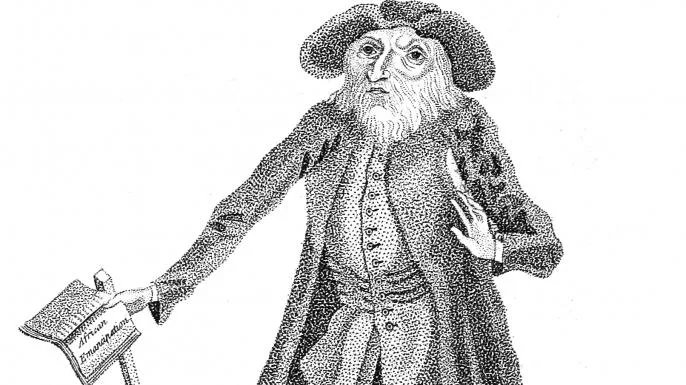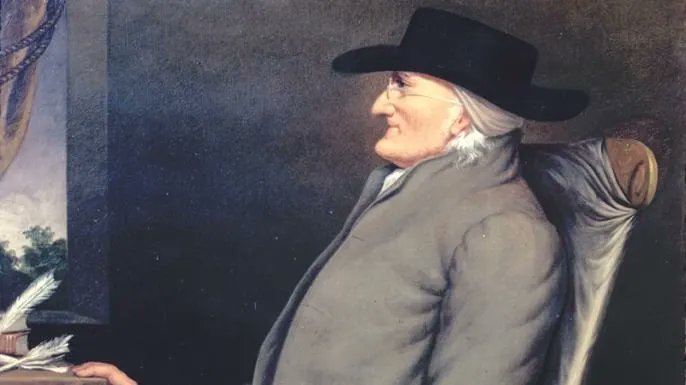So with Hamilton being available to stream, there& #39;s been a good deal of discussion on here about how the musical (and be extension Chernow& #39;s biography) tries to dodge and/or whitewash slavery. Which both do. Don& #39;t @ me. But what& #39;s really bothered me about all this? (1/?)
2. So many folks barging into that discussion with the classic defense of the enslaver Founding Fathers. "They were men of their times," we& #39;re told. "Quit judging the past by the standards of the present!" they say. This line of reasoning is a Totalizing Fallacy. And it sucks.
3. It& #39;s a bad-faith argument which takes away agency. Things just *happened*. Oh well, it was the past. But the slaveholding Founding Fathers-who created a government that perpetuated, at the very least implicitly sanctioned, enslavement-were not the only "men of their times."
4. You know who else was a "man of their time?" Benjamin Lay was a man of his time. The 4& #39;8" Quaker abolitionist saw the horror of slavery firsthand as a merchant in Barbados, and dedicated his life to convincing others of enslavement& #39;s evils.
5. At one point, Lay actually kidnapped the child of another member of the Quaker Meeting he attended to drive home the point about slavery& #39;s violence and cruelty. He was instrumental in pushing the Quakers to renounce slavery by 1758. He was a "man of his time."
6. You know who else was a "man of his time?" Olaudah Equiano, likely kidnapped from present-day Nigeria in the early 1760s. He survived the Middle Passage, and eventually gained his freedom. In 1789, he published an account of his enslavement, which caused a sensation.
7. In it, Equiano describes what he witnessed as an enslaved sailor: white sailors would "gratify their brutal passion with females not ten years old; and these abominations some of them practised to such scandalous excess" they were fired by the captain. A "man of his times."
8. You know who else was "a man of his time?" Moses Brown (of the family who founded Brown University). He came from a Providence, RI, slave-trading family, and even enslaved people himself. In 1770s, though, he converted to Quakerism, and renounced enslavement.
9. Brown manumitted the people he had enslaved, broke with his family& #39;s lucrative business ventures, and became a vehement abolitionist. (Ironically, his brother John was the first American prosecuted for violating the 1808 ban on international slave-trading.)
10. These are just three examples of "Men of their times," the same "times" as George Washington (enslaved hundreds of people), Thomas Jefferson (raped an enslaved woman repeatedly, beginning in her teenage years), and other "Founding Fathers" and enslavers.
11. Lay, Equiano, and Brown knew slavery was evil, that enslaving fellow humans was wrong. They didn& #39;t write waffling, weasely lamentations or duck the issue, but rather took stands that, while personally costly and risky, were at least principled. Men of their times.
12. Were Benjamin Lay, Olaudah Equiano, and Moses Brown NOT "men of their times?" Were the countless African men & women stolen and brutally enslaved NOT men and women of their times? (The whole "men of their times" argument ignores the the *women* who opposed enslavement, too!)
13. The "men of their time" excuse is exactly that: an excuse. An attempt to weasel out of actually reckoning with the past in all its complexity, violence, and shame. And it& #39;s fundamentally dishonest and ahistorical. People in the past did not "accidentally" enslave others.
14. So if you don& #39;t want to "judge the Founding Fathers" by the "standards of our times," FINE. Judge them by the standards of theirs. They will still come up wanting. /fin
PS-If your interest was piqued by Benjamin Lay, this book by Marcus Rediker is a lyrical and powerful biography that I highly recommend: https://www.amazon.com/dp/B01N4CVYMS/ref=dp-kindle-redirect?_encoding=UTF8&btkr=1">https://www.amazon.com/dp/B01N4C...

 Read on Twitter
Read on Twitter





